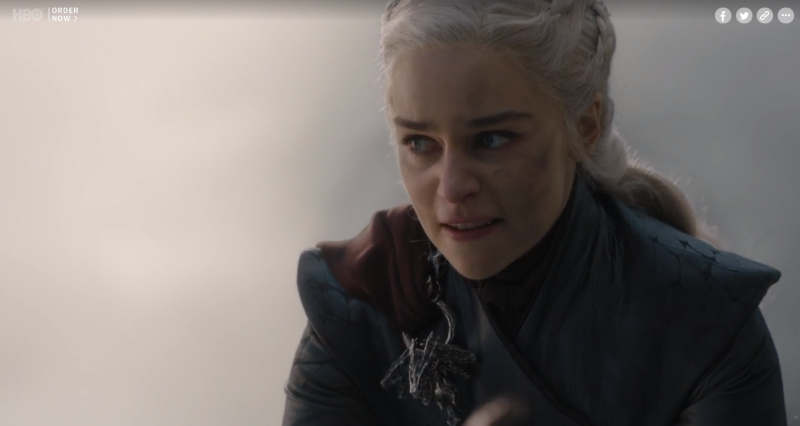
I’m going to open this by saying that I’m jumping to a conclusion. There’s still one episode to go at the time of writing, and we may get more insight Dany in that episode (I certainly hope so).
What has been strongly implied by, “The Bells,” and particularly by those stupid, “Inside the Episode,” segments is that Dany has just gone nuts. I find those segments incredibly frustrating and have for years, because they cut down complex plots and characters into bite-sized nuggets and throw all nuance in the toilet. Unfortunately, I can’t dismiss them entirely. One of the promotional videos by HBO released after the show was even called, “The Mad Queen.”
But in that video, Emilia Clarke said something that openly contradicted the narrative of, “madness.” She said that Dany’s turn to firebombing the city comes from, “this feeling that could be called, ‘Targaryen craziness,’ you could give it all of these names that it doesn’t deserve because it is just grief, it’s hurt, and she has this ability to make this hurt just a little bit less.”

Dany, realizing that the burning she’s already done hasn’t been enough.
The narrative of the hysterical woman, particularly as it relates to women being overwhelmed by power because their fragile minds couldn’t handle it (kill me now) is an old cultural trope. It turns up all through fantasy—just look at Galadriel in the LOTR movies, how she almost goes nuts, and her choice not to means she. “passed the test.” and. “will diminish and remain Galadriel.” It is, on the face of it, incredibly frustrating to see GoT endorsing this tired, sexist old narrative.
But I’d argue that things are rarely that simple on GoT, and this episode more than perhaps any since the Red Wedding was about subverting tropes.
At the root of the idea of hysteria is that women are prone to madness because they have women’s bodies. That without men and children to keep them tamed, they will go nuts. And, again, a surface reading aligns Dany’s character development with this trap. But that’s only the surface.
Let’s start at the end, with the idea of being, “tamed.” Dany deliberately surrounded herself with people who would, “tame,” her not because she was a woman, but because she was powerful. Like Oleanna said, “you’re a dragon. Be a dragon.” Those people kept her grounded, helped her by showing her what she looked like through their eyes. Jorah telling her, “you have a gentle heart,” Barristan warning her about the illusion of justice, Missandei telling her that there were solutions only she could see. And even they couldn’t stop all of her worst excesses, like crucifying the masters.
What she did at King’s Landing wasn’t a solution that only she could see. It was a solution that everybody could see, it was simple, it was the solution of a dragon. Because in the end, the main thing dragons do is burn.
The people who loved her are gone. The people who are left have betrayed her or failed her, in one way or another. The family she created for herself—a radical creation in itself that was completely at odds with traditional ideas of family—is broken. And the place she had claimed for herself in her traditional family, as the inheritor of a patriarchal monarchy founded on raw power, isn’t even really hers.
She hasn’t broken because she’s a woman and she’s fragile. Dany, Sansa, and Arya are the three strongest characters on the show. All have been broken and put themselves back together. Neither Sansa nor Arya have come close to the trope of hysteria, even as Sansa endured a Gothic nightmare.
Dany has broken because she’s a person. That’s the lie at the root of hysteria: that women are somehow different from, “normal people,” (men) and therefore more prone to madness. But the precedents for Dany’s behavior in this episode aren’t female, they’re male: her father and brother.
The narrative of hysteria was a way to excuse the way men treated women throughout history. In, “The Yellow Wallpaper,” a Victorian woman becomes hysterical because she’s been locked in a room for weeks with no stimuli. Who wouldn’t go nuts?
Dany has known what it is to be more vulnerable than the men. She has certainly been more vulnerable than Jon, the man her Westerosi allies would prefer, the person who has far more love than she does in Westeros. Because she is a woman, she has been exposed to a level of ugliness that Jon hasn’t. Because she is a person, this has damaged her. Because she has lost connections to the people around her, she has become isolated and lost resilience. And because she is a Targaryen, the mother of dragons, she has the power to lash out and damage others.
Hysteria is a shorthand, an excuse, a failure of story development. It hides the truth of human frailty, as exposed by women’s suffering, behind the idea that women are somehow less than human.
The narrative of Dany’s descent into mass slaughter is not perfect. We lack a crucial piece of information: why she sees the civilians of King’s Landing as her enemies, as ashes-in-waiting. And I would be lying if I said that having a rare powerful woman on television be corrupted by her power wasn’t frustrating. But the seeds of what happens when Daenerys Stormborn is pushed too hard have been there since the first season. Saying this is totally unearned, and that the writers have fallen back on lazy tropes, is a failure to look at the full context of her actions, at the narratives of other women in the show, and of the human heart that has been at war within Daenerys Targaryen since the moment we met her.
